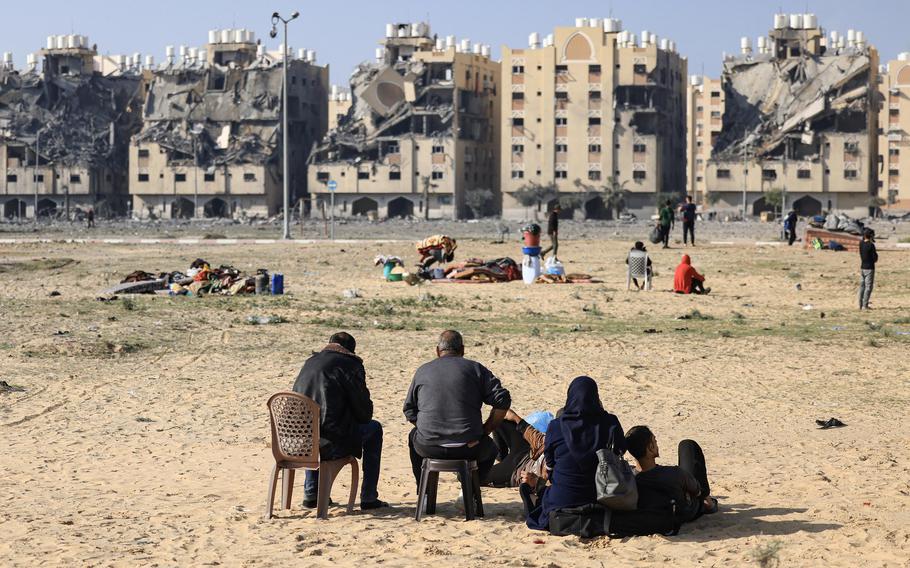
Residents of the Qatari-funded Hamad Town residential complex in Khan Yunis in the southern Gaza Strip sit with some of their belongings as they flee their homes after an Israeli strike on Saturday, Dec. 2, 2023. (Mahmud Hams, AFP/Getty Images/TNS)
(Tribune News Service) — Following the horrendous massacre of Oct. 7, Israelis are now united behind two immediate goals: Bringing back home their hostages and dealing Hamas a deadly blow. However, few in Israel, including the ministers of the emergency government formed to lead the war, have asked themselves the question any old and wise Middle Eastern person would have asked: wa ba’adein, and then what?
Certain answers to this question could and should be ruled out immediately, both on moral and practical grounds, such as the idea of relocating the people of Gaza to the Egyptian Sinai desert, or the vision of some ultra-rightist circles in Israel to settle in Gaza again, after pulling out of there in 2005. Even the declaration of Prime Minister Benjamin Netanyahu, that after the war Israel would maintain an Israeli security presence in Gaza, would not be so easily implemented. Vice President Kamala Harris summed it up: “Under no circumstances will the United States permit the forced relocation of Palestinians from Gaza or the West Bank, the besiegement of Gaza, or the redrawing of the borders of Gaza.”
So now we know what shouldn’t or wouldn’t be done. A crisis, however, presents new opportunities. Due to the vicious policy of Hamas, of using all the civilians in Gaza as human shields, the only way to uproot this terrorist organization entails a massive devastation to homes and infrastructure. And if some parts of Gaza today look like the European cities lying in rubble at the end of World War II, then the situation also calls for a remedy similar to the one employed after 1945: A New Marshall Plan for Gaza.
The original Marshall Plan, also known as the European Recovery Program, which was named after its originator, U.S. Secretary of State George Marshall, provided since 1948 $13 billion to reconstruct cities, industries and infrastructure heavily damaged during the war and to remove trade barriers between European neighbors — as well as foster commerce between those countries and the U.S.
Ideas calling for a Marshall Plan for the Middle East have been floated in the past, the last one produced in 2020 by the Cambridge Middle East and North Africa Forum. Although the project, led by a professor, Malik Dahlan, was carried out before the Abraham Accords, it definitely leaned on the proven yearning of people in the Middle East for a better economic future. A year earlier, James Zogby, president of the Arab American Institute, conducted a comprehensive poll in the region and concluded that “when we asked Arabs what their foreign policy priorities were for the region, far and away their top choices are investing more of the region’s wealth and expertise in creating a more prosperous and stable Arab world.”
A Marshall Plan for Gaza has a chance to succeed because it will serve several interests: The desire of Gazans to be rescued from their current miserable situation; the wish of Israel to see on its border a base for nation-building rather than a nest of terror; the quest of moderate Arab states for stability in the region; the economic interests of outside players; the opportunity for President Joe Biden to jump-start the Israeli-Palestinian peace process; and to rekindle the Israeli-Saudi rapprochement.
In pushing ahead a New Marshall Plan for Gaza, we should carefully learn the lessons from the Bremer Plan for the reconstruction of Iraq. The scholars of CMENAF explain why in spite of the American good intentions, the Bremer Plan failed: The Iraqis didn’t feel a sense of ownership; the plan encouraged nepotism and benefited the few whom the Americans liked; the heavy-handedness by the donor and investor countries was perceived as a new kind of colonialism; and finally, the endemic Middle Eastern corruption, in which greedy American corporations happily collaborated. In six months in 2003-2004, for example, $8.8 billion of the Iraqi government’s expenditures were unaccounted for, including $3.4 billion billed for “security.”
With all the uncertainties, though, there is a fair chance that, freed of Hamas’ venomous grip, Gaza can turn from a land of poverty and misery into an accelerator of progress and prosperity.
And if Israel has to stop before it cleanses all of Gaza of Hamas’ destructiveness, then southern Gaza will be crushed between Israel, determined not to let Hamas harass her again, and Egypt, which loathes this nest of Muslim Brotherhood on its doorstep. Northern Gaza, on the other hand, can follow the examples of Egypt, Jordan and the Gulf states, and enjoy all the benefits a peace with Israel can offer.
In that case, the two parts of Gaza, like those of Korea, would then stand out as examples of the two options open to inhabitants of the same region. In the words of Ronald Lauder, World Jewish Congress president and another champion of a Middle East Marshall Plan: “Palestinian parents would have to decide whether their hatred of Israel is so strong that they would prefer their children to grow up in poverty and die as ‘martyrs’ — or share in a better economic future with their Jewish neighbors and have fuller lives and happier families.”
Sounds naive and unrealistic? Maybe, but worth a shot, because all other scenarios have been tested and failed.
Uri Dromi is the founder and president of the Jerusalem Press Club and was the spokesman of the Yitzhak Rabin and Shimon Peres governments in 1992-1996.
©2023 Chicago Tribune.
Visit chicagotribune.com.
Distributed by Tribune Content Agency, LLC.